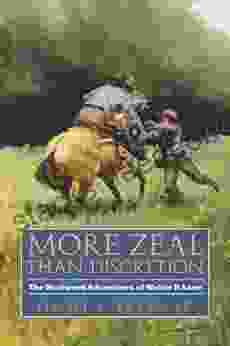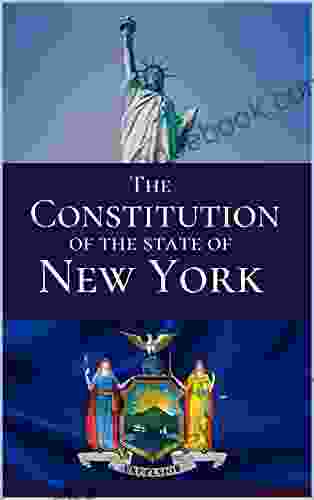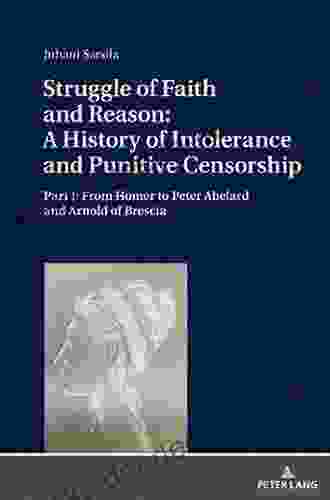A Comprehensive Examination of the History of Intolerance and Punitive Censorship: An Exploration of Suppression, Persecution, and the Fight for Free Expression

Throughout history, the suppression of ideas and the persecution of those who dissent from prevailing ideologies have been pervasive and persistent. This article delves into the history of intolerance and punitive censorship, examining the various forms it has taken, the motivations behind it, and its devastating consequences. We will also explore the ongoing fight for free expression and the importance of safeguarding this fundamental human right.
4.2 out of 5
| Language | : | English |
| File size | : | 5470 KB |
| Text-to-Speech | : | Enabled |
| Enhanced typesetting | : | Enabled |
| Word Wise | : | Enabled |
| Print length | : | 568 pages |
| Screen Reader | : | Supported |
Ancient Roots of Intolerance and Censorship
The suppression of dissent has its roots in ancient civilizations. In ancient Greece, Socrates was sentenced to death for allegedly corrupting the youth and impiety. In China, the Qin dynasty implemented a brutal campaign to suppress dissenting ideas, burning books and persecuting scholars.
During the Middle Ages, the Catholic Church played a dominant role in suppressing dissent. The Inquisition was established to root out heresy, and those found guilty faced severe punishments, including torture and execution. The suppression of scientific knowledge also occurred during this period, with Galileo being forced to recant his heliocentric theory under threat of torture.
Censorship in the Age of Enlightenment
The Enlightenment brought about a new era of intellectual exploration and the emergence of ideas that challenged traditional authority. However, censorship continued to be prevalent. In France, the monarchy suppressed writings that criticized the government or the Church. In England, the Licensing Act of 1662 gave the government control over the printing and distribution of books and other publications.
Despite these attempts at suppression, the Enlightenment thinkers fought for freedom of expression. John Milton's "Areopagitica" eloquently argued against censorship, asserting that "truth and understanding are not born out of violence and threats." Voltaire famously declared, "I disapprove of what you say, but I will defend to the death your right to say it."
Censorship in the 19th and 20th Centuries
The 19th century witnessed the rise of nationalism and the emergence of totalitarian regimes. In Russia, the Tsarist government suppressed dissent through censorship and secret police. In Germany, the Nazi regime engaged in widespread censorship, propaganda, and the persecution of dissidents, including the burning of books by Jewish and other authors.
The 20th century saw the continuation of censorship and suppression in various forms. In the United States, the Palmer Raids targeted suspected communists and anarchists. In the Soviet Union, Stalin's regime enforced strict censorship and brutally suppressed any opposition.
However, the fight for free expression also continued throughout this period. In the United States, the First Amendment to the Constitution guarantees freedom of speech, press, and religion. In other countries, activists and organizations worked tirelessly to promote freedom of expression and challenge censorship.
Contemporary Censorship and the Digital Age
In the digital age, censorship has taken on new forms. Governments and corporations use sophisticated surveillance technologies to monitor online activity and suppress dissenting voices. Social media platforms have been criticized for removing or shadow-banning users whose views deviate from mainstream narratives.
Despite these challenges, the fight for free expression continues. Activists and organizations advocate for the protection of online privacy and the freedom to express diverse opinions. The internet has also provided new platforms for marginalized voices to be heard, challenging traditional power structures and promoting open dialogue.
The history of intolerance and punitive censorship is a reminder of the fragility of free expression and the importance of fighting for it. Suppression of dissent has taken various forms throughout history, from ancient Greece to the digital age. However, the fight for free expression has also persisted, led by courageous individuals and organizations who recognize the vital importance of open dialogue and the exchange of ideas.
As we navigate the complexities of the 21st century, it is crucial to remain vigilant in protecting freedom of expression. This means challenging censorship in all its forms, online and offline, and promoting a culture of open dialogue and respect for diverse perspectives. By safeguarding free expression, we create a society where truth, understanding, and progress can flourish.
"Freedom of speech is a bedrock principle of a free and democratic society. It allows for the free exchange of ideas, the questioning of authority, and the pursuit of truth. Without freedom of speech, creativity and innovation are stifled, and society stagnates."
Edward Snowden, whistleblower and advocate for free speech
4.2 out of 5
| Language | : | English |
| File size | : | 5470 KB |
| Text-to-Speech | : | Enabled |
| Enhanced typesetting | : | Enabled |
| Word Wise | : | Enabled |
| Print length | : | 568 pages |
| Screen Reader | : | Supported |
Do you want to contribute by writing guest posts on this blog?
Please contact us and send us a resume of previous articles that you have written.
 Story
Story Genre
Genre Reader
Reader Library
Library Paperback
Paperback E-book
E-book Magazine
Magazine Newspaper
Newspaper Paragraph
Paragraph Sentence
Sentence Shelf
Shelf Glossary
Glossary Bibliography
Bibliography Foreword
Foreword Synopsis
Synopsis Scroll
Scroll Codex
Codex Biography
Biography Autobiography
Autobiography Memoir
Memoir Reference
Reference Encyclopedia
Encyclopedia Dictionary
Dictionary Thesaurus
Thesaurus Resolution
Resolution Librarian
Librarian Card Catalog
Card Catalog Archives
Archives Research
Research Reserve
Reserve Academic
Academic Reading Room
Reading Room Rare Books
Rare Books Study Group
Study Group Thesis
Thesis Dissertation
Dissertation Awards
Awards Reading List
Reading List Book Club
Book Club Textbooks
Textbooks Harvey Yoder
Harvey Yoder Robin Fedden
Robin Fedden Carol Edgarian
Carol Edgarian Elaine Castillo
Elaine Castillo Alastair Walker
Alastair Walker Joy Beth Smith
Joy Beth Smith Sylwia Skbooks
Sylwia Skbooks Jimmy L Bryan Jr
Jimmy L Bryan Jr Mitch Peeke
Mitch Peeke Adrian Trendall
Adrian Trendall K J Donnelly
K J Donnelly Lynne Barr
Lynne Barr Bright Summaries
Bright Summaries John R Gerdy
John R Gerdy Tom Poland
Tom Poland Bruce Holsinger
Bruce Holsinger Ha Jin
Ha Jin S L Wallace
S L Wallace Clara Meath
Clara Meath Dan Levenson
Dan Levenson
Light bulbAdvertise smarter! Our strategic ad space ensures maximum exposure. Reserve your spot today!

 John GrishamDiscover Comprehensive Medical Insights with Medical Masterclass 3rd Edition:...
John GrishamDiscover Comprehensive Medical Insights with Medical Masterclass 3rd Edition:... Roy BellFollow ·10.6k
Roy BellFollow ·10.6k Jake CarterFollow ·7.1k
Jake CarterFollow ·7.1k Forrest ReedFollow ·17.3k
Forrest ReedFollow ·17.3k Eliot FosterFollow ·6.2k
Eliot FosterFollow ·6.2k Clarence BrooksFollow ·14.6k
Clarence BrooksFollow ·14.6k Lawrence BellFollow ·4k
Lawrence BellFollow ·4k Heath PowellFollow ·9.7k
Heath PowellFollow ·9.7k Thomas PowellFollow ·3.4k
Thomas PowellFollow ·3.4k

 Amir Simmons
Amir SimmonsMore Zeal Than Discretion: A Closer Look at the Risks and...
Enthusiasm is often seen as a positive...

 Wayne Carter
Wayne CarterYear of the Dog: American Poets Continuum 178
Year of the Dog is a...

 David Foster Wallace
David Foster WallaceThe Constitution of the State of New York: A...
The Constitution of the...

 Harvey Bell
Harvey BellSmall Cetaceans of Japan: Exploitation and Biology
Small cetaceans, including...

 Blake Bell
Blake BellEffortless Elegance: A Comprehensive Guide to Captivating...
In the realm of crocheting,...
4.2 out of 5
| Language | : | English |
| File size | : | 5470 KB |
| Text-to-Speech | : | Enabled |
| Enhanced typesetting | : | Enabled |
| Word Wise | : | Enabled |
| Print length | : | 568 pages |
| Screen Reader | : | Supported |











